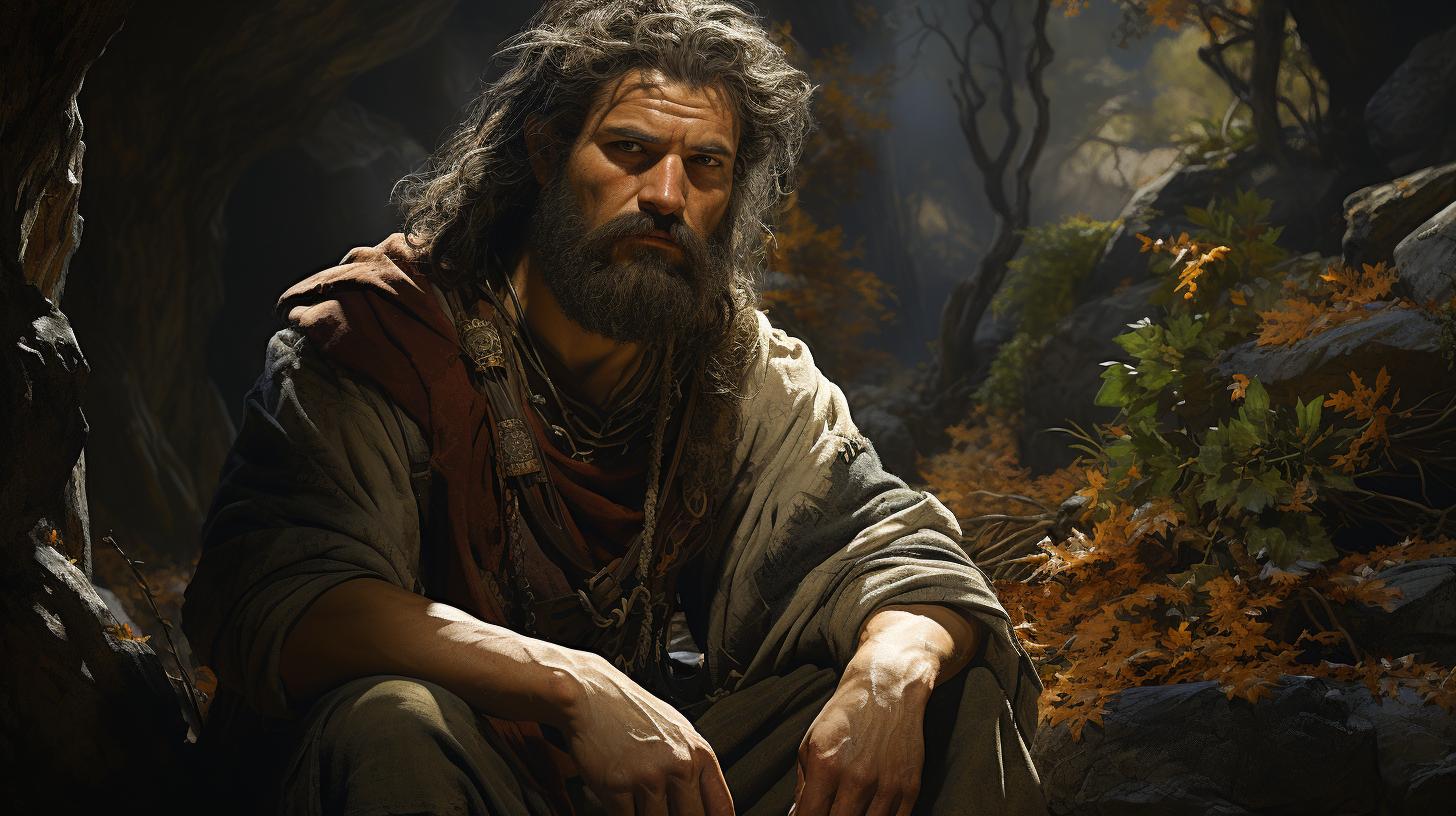Discover the Fascinating Myth of Philoctetes in Greek Mythology

Philoctetes, a renowned archer and hero of Greek mythology, played a significant role in the Trojan War. Exiled on the island of Lemnos, Philoctetes endured ten years of solitude.
Eventually, Odysseus and the Achaean heroes tricked him into rejoining the Greek army and healed his wound. Philoctetes’ valor and contributions in the war were crucial. Additionally, the surviving play by Sophocles sheds light on his story.
Philoctetes’ myth has left a lasting legacy, offering valuable lessons and themes. His tale has inspired various artistic representations and holds a significant place in ancient Greek literature.
The Mythical Origins of Philoctetes in Greek Mythology
The story of Philoctetes, a renowned hero in Greek mythology, encompasses fascinating mythical origins and remarkable archery skills.
Philoctetes was the son of Poeas, the king of Meliboea in Thessaly, and Demonassa or Methone. His prowess as an archer became legendary, and he became a significant participant in the Trojan War.
Although there were multiple tragic plays written about Philoctetes by renowned Greek tragedians, only Sophocles’ work survives to this day.
Philoctetes: Son of Poeas and Demonassa
Philoctetes, the son of Poeas and Demonassa, hailed from the kingdom of Meliboea in Thessaly. His lineage and noble birth played a crucial role in shaping his heroic journey. As the offspring of a royal couple, Philoctetes inherited a legacy of strength, courage, and archery skills that became instrumental in his eventual involvement in the Trojan War.
Philoctetes’ Renowned Archery Skills
Among his many attributes, Philoctetes stood out for his extraordinary archery skills. His ability to wield a bow and accurately shoot arrows made him a formidable warrior in battle. Throughout his mythological narrative, these legendary archery skills would prove invaluable to the Greek army’s war efforts against Troy.
Philoctetes and the Trojan War
Philoctetes played a significant role in the Trojan War, with his story encompassing his exile on the island of Lemnos, the various versions surrounding his abandonment, and the decade of solitude he endured.
Philoctetes’ Exile on the Island of Lemnos
During the Greek army’s journey to Troy, Philoctetes was exiled and left behind on the island of Lemnos. The exact reasons for his abandonment vary in different versions of the myth, including being bitten by a snake sent by Hera as punishment or sustaining an injury from stepping on the ashes of Heracles. Another account tells of him being bitten during a sacrifice to Apollo on the island of Tenedos, while another suggests he was wounded after violating a nymph’s sanctuary on the isle of Crise.
Various Versions of Philoctetes’ Abandonment
The reason for Philoctetes’ abandonment remains debated due to the multiple interpretations of the myth. While the cause of his exile differs, the outcome remains consistent: Philoctetes was left alone on Lemnos, isolated for ten years without the support or companionship of his fellow Greeks.
Philoctetes’ Wound and Ten Years of Solitude
During his ten-year exile, Philoctetes endured the pain of his wound. His isolation on Lemnos was both a physical and emotional ordeal, as he grappled with his own suffering and the absence of his compatriots.
Despite his hardships, Philoctetes’ unwavering spirit and determination would come into play later in the war.
Philoctetes’ Encounter with Odysseus and the Achaean Heroes
In the epic tale of Philoctetes in Greek mythology, his fateful encounter with Odysseus and the Achaean heroes plays a crucial role in his journey. This section delves into the pivotal events surrounding this encounter, including the need for Heracles’ bow and arrows and Odysseus’ cunning deception leading to Philoctetes’ eventual healing.
The Need for Heracles’ Bow and Arrows
Recognizing the indispensable power of Heracles’ legendary bow and arrows, the Greek army found themselves in a predicament during the Trojan War. It became evident that securing these weapons was necessary for their victory.
Thus, Odysseus, along with a group of Achaean heroes, set out on a mission to retrieve them.
Odysseus’ Deception and Philoctetes’ Healing
Knowing Philoctetes’ resentment and bitterness resulting from his abandonment on the island of Lemnos, Odysseus devised a deceptive plan. With the aid of Machaon or Podalirius, sons of the renowned healer Asclepius, they managed to heal Philoctetes’ long-standing wound.
Odysseus lured Philoctetes by promising him a return to the Achaean army and the acknowledgment he deserved as a hero. This cunning stratagem reconciled Philoctetes with the Greek forces, uniting his remarkable archery skills and unwavering determination with their war efforts.
This encounter marked a significant turning point for Philoctetes, as his physical and emotional afflictions were finally alleviated, paving the way for his active participation in the Trojan War.
Philoctetes’ Role in the Trojan War
Throughout the Trojan War, Philoctetes played a significant role in the Achaean army.
After being abandoned on the island of Lemnos for ten years, he was finally reunited with his fellow soldiers, marking a crucial turning point in the war.
Philoctetes’ Reunion with the Achaean Army
Philoctetes’ reunion with the Achaean army brought renewed hope and strength to their cause.
His return infused the troops with a renewed sense of determination and purpose. His wealth of experience as a skilled archer proved invaluable, as he led the soldiers in strategic attacks against the Trojans.
Philoctetes’ Valor and Contributions to the War Effort
Philoctetes’ valor and bravery on the battlefield were unmatched. His exceptional archery skills and unwavering commitment to the Achaean cause made him a formidable warrior. Philoctetes’ contributions were pivotal in several key battles, inflicting significant casualties on the Trojans and turning the tide of the war.
Furthermore, his unwavering loyalty to his comrades and unwavering determination to see the war through to its end served as an inspiration to all. Philoctetes’ heroism and sacrifices during the Trojan War solidified his place as a revered figure in Greek mythology.
The only Surviving Play about Philoctetes by Sophocles
The story of Philoctetes has been the subject of various Greek tragedies, with four prominent tragedians having written on this myth. However, only Sophocles’s play on Philoctetes has survived to this day, captivating audiences with its rich portrayal of the hero’s journey.
The Rendition of Philoctetes’ Myth by Ancient Greek Tragedians
Ancient Greek tragedians recognized the significance of Philoctetes’ story and crafted their plays around it. Alongside Sophocles, Aeschylus, Euripides, and Accius also explored different aspects of his myth, showcasing the hero’s inner struggles, isolation, and eventual redemption.
Analysis of Sophocles’ Philoctetes
Sophocles, known for his mastery in portraying human emotions and moral dilemmas, delves deep into Philoctetes’ character and his place in the Trojan War. Through his play, Sophocles examines themes of betrayal, integrity, and the complexities of heroism, inviting the audience to reflect on the complexity of human nature.
Presented with stunning dialogue and thought-provoking scenes, Sophocles’s Philoctetes offers a unique perspective on the hero’s journey, resonating with audiences across centuries and bridging the gap between ancient Greek mythology and contemporary storytelling.
Philoctetes in Ancient Greek Art and Literature
Philoctetes’ captivating story has inspired numerous artistic representations and has left a lasting impact on ancient Greek art and literature. This section delves into the iconic representations of Philoctetes in artwork and explores his profound influence on ancient Greek literature.
Iconic Representations of Philoctetes in Artwork
Artists throughout history have depicted Philoctetes in various forms, capturing his physicality, heroism, and struggles. From intricate sculptures to detailed paintings, these iconic representations showcase the resonance of his myth in visual art.
These artistic interpretations offer unique insights into Philoctetes’ character and invite viewers to delve deeper into his compelling narrative.
Philoctetes’ Influence on Ancient Greek Literature
The multifaceted character of Philoctetes has also played a significant role in shaping ancient Greek literature. Writers and poets have explored his complexities, emphasizing his isolation, resilience, and unwavering commitment to his beliefs.
Philoctetes’ experiences often serve as powerful metaphors for human suffering, perseverance, and the enduring struggle between fate and personal agency. Through their literary works, these ancient Greek authors pay tribute to Philoctetes’ indomitable spirit and eternal presence in mythological storytelling.
The Legacy of Philoctetes in Greek Mythology
Philoctetes’ Impact and Significance in Mythology
Philoctetes, the renowned archer and hero of Greek mythology, left a lasting impact on the realm of myth and legends. His story, filled with betrayal, exile, and eventual redemption, has captivated generations and inspired numerous artistic interpretations.
Philoctetes’ significance lies in his portrayal as a wounded warrior whose resilience and determination showcase the complexities of human nature. Through his character, the myth explores themes of loneliness, forgiveness, and the pursuit of honor in the face of adversity.
Lessons and Themes Derived from Philoctetes’ Story
The tale of Philoctetes offers various lessons and themes that continue to resonate today. One prominent theme is the exploration of the consequences of abandonment and betrayal. The manner in which the Greeks left Philoctetes on the island of Lemnos highlights the destructive nature of deceit and the importance of trust and loyalty in relationships.
Another lesson derived from Philoctetes’ story is the transformative power of compassion and forgiveness. Despite the pain and suffering inflicted upon him, Philoctetes ultimately finds the strength to forgive and reconcile with those who wronged him.
This serves as a powerful reminder that forgiveness can lead to personal growth and healing.
The myth also explores the concept of heroism, portraying Philoctetes as a flawed but courageous individual who overcomes immense challenges.
His unwavering determination and selflessness in the face of adversity inspire us to embrace our own inner strength and strive for greatness.
.



















